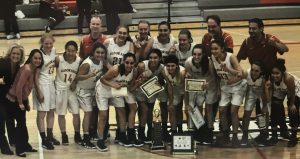LONGTIME BASKETBALL COACH SUFFERS NEAR DEATH EXPERIENCE AND LIVED TO TELL ABOUT IT
May 15th, 2020 started off as just another day in the retired life of longtime basketball coach Rich Harbin. He spent 13 seasons building up the girls basketball program at Valley High School. Harbin led the North Valley school to more than 200 wins, seven district championships and multiple state tournament appearances. In 2017, he left Valley to take over the girls basketball program at Eldorado High School. After two seasons, Harbin stepped down as head coach of the Eagles. Now was his time to enjoy the next chapter in his life.
That Friday evening could have been the last chapter.
“It was sudden and unexpected,” Harbin recalls. “I was eating and had some food that got stuck. I tried to wash it down and that didn’t work. I started coughing violently and a lot of blood came out. Within 30 seconds, there was so much pain on the right side of my chest, I knew something was wrong. I thought I pulled a rib or muscle in my lower back. I ended up in the emergency room.”
When doctors finally had a chance to attend to Rich, the news wasn’t good.
“The emergency room doctor was standing over me and said, ’You have a critical situation, it’s life threatening. There’s limited time and there’s no one in New Mexico that deals with this.’”
What was ‘This’?
It’s called esophageal perforation. It’s a hole in the esophagus, the muscular tube that food travels through on its way from the mouth to the stomach. “It was a long tear,” Harbin said. “I’ve had acid reflux for a long time. Maybe through the years there was damage and deterioration.”
Without a specialist to treat this very serious medical condition, Harbin was rushed to the airport and immediately flown to Denver where the doctors in Colorado took over. “They put in stents in my throat,” Harbin described. “It’s pretty invasive. They also put three tubes in my chest to drain the fluids. There can be damage to the lungs and heart.”
The following day, Harbin told the nurse in recovery he didn’t feel well. Doctors conducted tests and discovered the original stent wasn’t working. “Fluids were leaking and they thought I was going septic,” Harbin said. (Sepsis is a potentially life-threatening condition caused by the body’s response to an infection.) Harbin would have to go back in for surgery and repeat the process.
“You have a critical situation. It’s life threatening.”
Those words from the emergency room doctor echoed in Harbin’s head. “It started to set in,” Harbin said reflecting on the seriousness of his condition.
The father of three daughters started to say his goodbyes.
“At that moment, I wasn’t thinking about myself,” Harbin painfully recalls. “It was more about how do you say goodbye and tell them you love them and thank them for making your life better. I had so many things to say, but I didn’t have the time to say it. I told my daughters to tell everyone thank you and I love them.”
So, Harbin went in for a second invasive procedure followed by days in the Intensive Care Unit.
By himself.
Isolated.
Due to COVID-19 restrictions, Rich wasn’t allowed to have any visitors, no one was allowed in the room.
Little did he know he would be flooded with well-wishes, texts, and video messages from friends and family reminding him to fight and pull through.
“Hang in there!”
“Can’t wait to see you again!”
“Get better soon!”
Messages like those helped save his life.
“I will forever be indebted to those people,” Harbin said. “I was by myself, thoughts start running through your head, but every day someone was talking or texting. Even just a simple message to let you know they were thinking of you is very powerful. It gave me such confidence to get through it.”
Harbin also had to rely on some of his own advice that he used to preach to his former players to help fight this life-threatening situation. “I used to tell my teams when things were tough to not give in. Whether it was conditioning or they weren’t playing well, it wasn’t as tough as some of the things we might face in our life. You are going to find a way.”
You are going to find a way.
“During the first procedure, I clearly remember a thought to fight and fight,” he recalled. “It was in my head, ‘Don’t go quietly, just fight.’ I had to find a way to stay positive and know that I was going to get through this.”
And he did.
Harbin started to stabilize and was moved out of ICU. After close to two weeks in the hospital, Harbin eventually returned home to New Mexico. Harbin still had the stents in his chest for almost three months. “Every day you knew they were there, you could feel ‘em,” he said. On July 30th, Harbin had the stents removed from his esophagus and chest cavity and was cleared of having no leaks.
“I’m officially on the road to recovery.”
So, what now?
Harbin is on a restricted diet, “but can go back to eating normal soon.” There’s medication he will have to take for the rest of his life, along with changing his eating habits with smaller portions and not as quickly. He lost 22 pounds and has to build up some more of his energy and stamina, but “It’s like night and day,” he said. “There’s no pain, I feel normal.”
Harbin repeatedly says he was overwhelmed and humbled to have all the support. “You don’t understand the impact you can have on people,” he said. “One of the reasons I got into coaching and teaching was because I had someone to push me to be better. I was overwhelmed that a coach could invest so much and have such an impact on me. They made me want to teach and coach. Those coaches make you want to be better and more caring and understanding to help impact others.”
Harbin says he would like to get back into coaching and teaching sometime. He feels like he has a lot to give back to our youth today. “When you experience something like this, it does change some of your mindset,” he said. “It reminds you to embrace each day and remember that you can learn to navigate any obstacles that come up. The most important thing is how we cope and navigate what happens to us.”
“One of the most beautiful messages that sports delivers is overcoming adversity,” Harbin says. “As teammates, you have to rely on each other and pick yourself up. That’s what sports is. It’s always about recovery, resilience and moving forward. There are so many people involved in helping an individual achieve something. I truly think that came into play for me. I had teammates cheering for me which made a huge difference.”
One way or another, Rich Harbin wants to be involved in supporting athletics. He had so many people supporting him, now it’s his turn.






